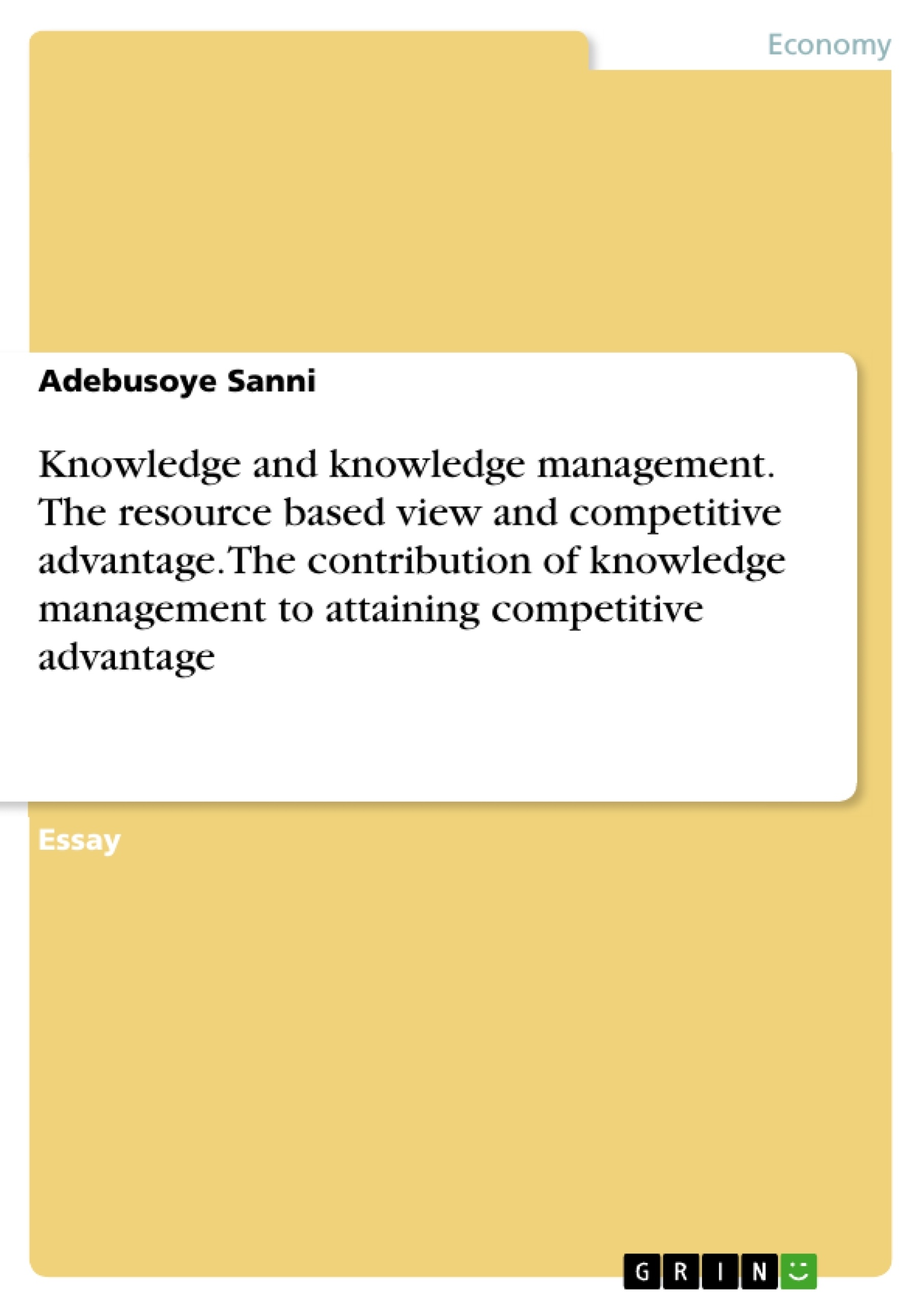Knowledge has been identified as a crucial source of attaining competitive advantage and the creation of value (King and Zeithaml, 2003), and a fundamental component for growth and important criteria for organizations with global interest. Knowledge management is a method of collecting, organizing, and sharing worker intellectual capital all through the organization to guarantee the firm's effectiveness. Kelleher and Levene (2001) sharing knowledge all through the organization to promote current firm's business processes, brings about effective business process and eliminates unnecessary process.
The resource based view has advanced to become an important theory in the field of strategy from the 1980's (Wernerfelt, 1984 ; Barney 1991 ; Grant 1991). The resource based view moves concentration of researchers in the field of strategy from external resource to organization's internal resources. It sets up the different types of resources different from other organizations as a crucial sources of advantage amongst rivals (Peteraf, 1993; Barney 1991) and determines different factors that assist organizations to keep up with their superior resource position and competitive advantage (Dierickx and Cool, 1989; Barney 1991; Ghemawat,1986).
The necessity for developing competitive advantage over rivals is of top most discussion in strategic management subjects (Rahimli, 2012). Competitive advantage of an organization is said to exist when the resource of an organization is exceptional among other rivalry industries (Kotler and Keller, 2012).
This essay will examine more literature in knowledge and knowledge management, the resource based view and competitive advantage and the contribution of knowledge management to attaining competitive advantage.
Inhaltsverzeichnis (Table of Contents)
- Introduction
- Knowledge and Knowledge Management
- The Resource-based view
- Competitive Advantage
- Importance and Contribution of Knowledge management to organizational resources for competitive advantages
- Conclusion
Zielsetzung und Themenschwerpunkte (Objectives and Key Themes)
This essay explores the crucial role of knowledge management in achieving competitive advantage within the framework of the resource-based view. It delves into the creation, sharing, and utilization of knowledge as a core organizational resource, drawing upon relevant literature sources.
- Knowledge Management as a key element of competitive advantage.
- The Resource-based view as a framework for understanding organizational competitive advantage.
- The importance of knowledge creation, sharing, and utilization in building competitive advantage.
- The relationship between knowledge management and sustainable competitive advantage.
- The various types of knowledge, including tacit and explicit knowledge, and their implications for organizations.
Zusammenfassung der Kapitel (Chapter Summaries)
- Introduction: This section provides a general overview of the essay's focus, highlighting the significance of knowledge management in achieving competitive advantage.
- Knowledge and Knowledge Management: This chapter delves into the concept of knowledge as an advanced level of abstraction, encompassing ideas, training, abilities, and intelligence. It explores the two types of knowledge - tacit and explicit - and how they are created. The chapter also discusses knowledge management as a structured approach to managing an organization's knowledge assets, encompassing creation, organization, sharing, retrieval, and assessment.
- The Resource-based view: This chapter examines the resource-based view as a theoretical framework that emphasizes internal resources as the key drivers of competitive advantage. It explores the various types of resources, including knowledge, intangible and tangible assets, and human resources. The chapter also delves into the criteria for evaluating the value, rarity, imitability, and appropriability of resources.
- Competitive Advantage: This chapter explores the concept of competitive advantage as an organization's ability to outperform its rivals. It examines different perspectives on achieving and sustaining competitive advantage, including through market position, creativity, and difficulty of imitation.
- Importance and Contribution of Knowledge management to organizational resources for competitive advantages: This chapter delves into the critical role of knowledge management in achieving competitive advantage. It explores how knowledge management systems can contribute to organizational strength and value creation, ultimately leading to sustainable competitive advantage.
Schlüsselwörter (Keywords)
The key terms and concepts explored in this essay include knowledge management, competitive advantage, resource-based view, tacit knowledge, explicit knowledge, intellectual capital, sustainable competitive advantage, and organizational resources. The essay emphasizes the importance of effectively managing knowledge assets to achieve and maintain competitive advantage in the globalized business environment.
- Quote paper
- Adebusoye Sanni (Author), 2017, Knowledge and knowledge management. The resource based view and competitive advantage. The contribution of knowledge management to attaining competitive advantage, Munich, GRIN Verlag, https://www.grin.com/document/388171




